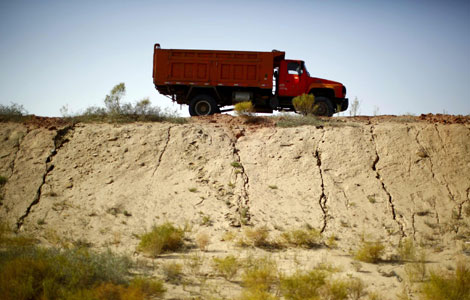You can bet the farm on tradition
Updated: 2013-09-24 07:15
By Li Wenhua (China Daily)
|
||||||||
It is very important for the government to pay equal attention to heritage conservation and economic development. Commercialization of cultural heritage is not a bad thing if it uses the attraction of scenic spots to generate benefits for local economies. But commercialization should be based on the cultural elements, not on the blind pursuit of profit.
It is crucial to involve communities in the mission to protect "heritage" villages, which are living sites with high productive and ecological functions that help farmers lead a sustainable existence. Therefore, farmers should be allowed to play the role of guardians and heirs of these cultural heritage sites.
The authorities need to realize that the country's rich agricultural heritages cannot be preserved by housing them in museums and relocating farmers to cities or other areas.
There is need for the government to guide farmers and residents of "heritage" villages to play a proactive role in the protection of traditional agriculture by developing eco-friendly tourism and agriculture, and handicraft and cultural industries.
The government also needs to develop modern eco-friendly agriculture by using the approach of traditional agriculture. It should attach importance not only to the protection of traditional farming resources, but also to the improvement of the living standards of farmers, because without their help traditional agriculture cannot survive.
Organic agriculture and eco-friendly tourism could be used to help improve the living standards of the residents of the "heritage" villages and to promote the diverse functions of agricultural heritage.
Moreover, for rural development and protection of traditional villages, the authorities need to borrow some ideas from other countries.
Many European countries have preserved traditional villages because they respect history and tradition and, at the same time, use them to encourage innovation. These countries have shown the benefits of using eco-friendly tools for the development of traditional villages.
France, for example, is one of the most industrialized countries in the world but it is also home to a large number of traditional villages. And some of the agricultural and other products that these villages produce are world famous brands.
Leisure agriculture, as promoted in some Taiwan villages, is another way traditional agricultural villages on the Chinese mainland could be protected, because the practice integrates production, life and ecology, and exploits natural resources to the least possible extent.
There is little doubt that Chinese government has nothing to lose but a lot to gain by protecting villages and villagers that practice traditional, eco-friendly agriculture.
The author is an academic at the Chinese Academy of Engineering and International Eurasian Academy of Sciences.

 US astronaut praises China's space program
US astronaut praises China's space program
 Christie's holds inaugural auction
Christie's holds inaugural auction
 Aviation gains from exchanges
Aviation gains from exchanges
 Early fish ancestor found
Early fish ancestor found
 Singers' son sentenced to 10 years for rape
Singers' son sentenced to 10 years for rape
 Djokovic announces engagement to girlfriend
Djokovic announces engagement to girlfriend
 Taipei, LA and Singapore top travel search growth list
Taipei, LA and Singapore top travel search growth list
 Big cats are part of the family
Big cats are part of the family
Most Viewed
Editor's Picks

|

|

|

|

|

|
Today's Top News
Russia to guard Syria chemical weapon destruction
Interpol issues arrest notice for 'white widow'
US astronaut praises China's space program
Joint talks on trade in services
Philippines-US drill raises concern
Abe blames China for defense spending
Courier reaches for the sky with drone
President Xi touts moral models
US Weekly

|

|





